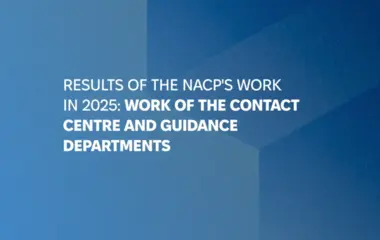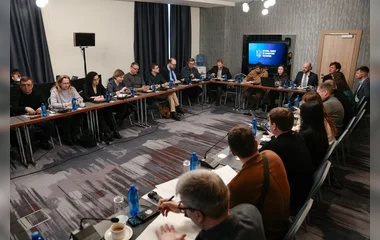On 27 March 2025, an interview with NACP Head Viktor Pavlushchyk was published for NV. Read the full text below:
NACP Head Viktor Pavlushchyk explained to NV in detail whether it is possible to control the lifestyle of high-ranking officials in times of war, what is happening in defence procurement, and why his former classmate is among his deputies.
Journalist - Tetiana Bezruk, photo by Oleksandr Medvedev, NV
Three heads, an audit, and constant changes in legislation that make or break the filing of declarations by officials. This is how ten years of work of one of the key independent anti-corruption bodies of the state, the National Agency on Corruption Prevention (NACP), look like.
The last three of these ten years have been even more challenging, as during the full-scale invasion, high-ranking officials withheld their financial statements from the public, citing security concerns. E-declaration has now been restored, but the Verkhovna Rada is trying to limit the NACP's ability to monitor the lifestyles of top officials, MPs and other civil servants and their family members.
Viktor Pavlushchyk, the head of the NACP, who, along with the agency's 10th anniversary, also celebrates his first year in office, told NV about how the agency has regained control over the reporting of top officials, monitoring their lifestyles, and friends and problematic people among his deputies.
About the deputies: a former head, a former classmate and a former offender
Let's start with why your deputy Artem Sytnyk resigned last June and whether you were comfortable working as your former head's boss, since you worked at NABU when it was headed by Sytnyk?
Artem Sytnyk's dismissal was by mutual agreement. I think it would be wrong to discuss our conversation with him about this without Artem Sytnyk's permission. We had a conversation, a decision was made, and you can see the result.
As for the fact that I am working with him as a head now, I do not see any problems with that. In my life, I follow the approach that at any time your boss can become your subordinate, and your subordinate can become your boss.
After Sytnyk's dismissal, Serhii Hupiak became your deputy - how did you meet him?
This is not new information - Mr Hupiak was my classmate. We studied together in the 10th and 11th grade at a law lyceum. After school, many of us went to study at specialised universities and ended up working in law enforcement.
The fact that you have known Hupiak for a long time is viewed by experts as a good thing, because you know this man and can trust him. On the other hand, it is a long-standing story that heads of agencies hire their friends for such positions. Have you found a middle ground in this matter?
We don't have time to train a person from another field for such a position, and he demonstrated knowledge and vision at all stages of the competition for the position. He was the best prepared candidate for the deputy position and was ready to start work immediately. This is very important nowadays.
The fact that we know each other does not fall into the category of private interest.
Does your other deputy, Mykola Korneliuk, have a public declaration? If not, when can it be made public?
It has been withdrawn from public access on the basis of a submission by the Head of the Security Service of Ukraine since Mr Korneliuk's employment there. Currently, any declaration can only be returned upon a similar request from the initiator of the withdrawal. However, the NACP plans to change this and develop a mechanism for returning declarations to public access at the initiative of the declarant, and a public discussion of this draft order will take place on 31 March.
There is also a ruling of the Zhytomyr court that states that Mr Korneliuk was in the Unified State Register of Persons Who Committed Corruption or Corruption-Related Offences. But if you look at the register now, he is not there. How and why did he disappear from it?
In 2022, the NACP removed from the Register of Offenders persons who were directly involved in the country's defence, including Korneliuk.
On the resumption of declaration verification
You took over as head of the NACP after the audit, and your appointment almost coincided with the resumption of declaration verification. How would you describe this period in your work? Was there a storm in the agency's work?
The audit identified growth points. NACP was the first state agency to undergo such an audit, and it was indicative of Ukraine as a whole.
Indeed, my election coincided with the restoration of a number of NACP functions. First of all, we are talking about the restoration of declaration, the restoration of the NACP's obligation to verify declarations, the restoration of political party reporting and verification, and the restoration of special inspections. That is, those powers that have not been exercised for several years.
Is it important for the NACP to monitor the lifestyles of high-ranking officials? And how do you react to certain legislative initiatives that may remove this function from the NACP?
Now there is a threat of levelling the lifestyle monitoring tool, which has proven its effectiveness. More than UAH 30 million is already in the country's budget thanks to the work of this area together with the SAPO prosecutors, and more than UAH 200 million is awaiting a court decision to be recovered as state revenue. In the coming days, MPs will vote on the amendments to the law you mentioned. We have sent a letter to Mr [Speaker of the Verkhovna Rada Ruslan] Stefanchuk, informed him of the threat and are trying to draw everyone's attention to it as much as possible. Our public council issued a statement, which was supported by 17 other NGOs.
Amendments to the law may limit lifestyle monitoring to 90 days, which is not enough, especially given the time required to collect data on assets abroad. The authors of the amendments also want to narrow the circle of people who can be subject to lifestyle monitoring to family members listed in the declaration. We are well aware of the practice of dishonest officials who usually register their illegal assets with drivers, matchmakers, godfathers, etc., so such persons will fall out of our field of vision. The lawmakers also plan to change the rules of lifestyle monitoring so that it can be conducted only for the period of the official's tenure. This is unacceptable, as it will limit the NACP's ability to make an objective assessment of the legality of all assets acquired during the labour and professional life of the declarant. It will be more difficult for the NACP to verify the information provided by the declarants on the legality of the origin of questionable assets acquired outside the period of public service.
During the work of the previous head of the NACP, the auditors noted that there was no mechanism for assessing declarations of representatives of the intelligence services. This is a rather serious issue given the full-scale war and the data of people involved in intelligence, whom Ukraine, as a state, must protect. How do you check the declarations of intelligence officers?
The mechanism is well established. Since my appointment, we have made some minor reorganisational changes, including the creation of a special unit that deals with these issues. This unit approves the relevant procedures for conducting inspections. And now we are communicating with all the bodies that fall into this category to ensure that such inspections can be carried out. The audit recommendations have been taken into account.
How does it work - checking the declarations of officials in intelligence agencies and special services?
They submit declarations within their organisations, and we can of course take these declarations and check them. This information is restricted and cannot be simply disclosed. According to the law, there is a procedure for gaining access to these documents, and according to our powers, we can do it.
From the NACP's report on the results of its work in 2024: according to the results of inspections, in 353 declarations, i.e. in 50% of the completed ones, inaccurate information worth UAH 3.8 billion, signs of illicit enrichment worth UAH 192.1 million and unjustified assets worth more than UAH 47 million were found. For comparison, in 2021, violations were found in 27% of completed audits. You point out that this shows that the application of a risk-based approach to the selection of declarations for full verification in 2024 has significantly increased the efficiency of work. Don't you think this could be due to the fact that declarations were simply not checked in previous years?
I think not. Firstly, why did we take 2021 as a comparison? This is the most relevant year during which full verification of declarations was carried out and we could assess their quantity and quality. There is a difference in approach here. In 2021, declarations were selected by position category, from top to bottom. As a result, the same people were checked every year.
In 2024, the approach was changed to a risk-based one. Declarations are assigned a risk rating. First of all, the NACP checks the information in the declaration with databases and registers, analyses the person's ability to acquire property that he or she has acquired during this year or that he or she has with the income that he or she received during the year. If a person has acquired significantly more property than their family's income allows, the risk rating will certainly show this. The declaration will receive a high risk rating and it will be subject to a full audit. During the full audit, we can determine whether the expenditures are in line with the income. Using this approach, we take for verification the declarations that software products identify as high-risk.
We also check declarations upon requests from civil society and law enforcement agencies that come to the NACP. Therefore, this combined approach allows us to take into account those critical situations that are not recorded in the registry.
After the automated verification, is the declaration checked by a NACP employee?
Next, the full verification mode is switched on, and full verification is manual work, which involves sending a large number of requests, comparing information, requests may be sent to foreign jurisdictions, then the final analysis of the information and decision-making on the fact of the identified violations is carried out.
When an NACP employee sees that the amount of assets and income is incomparable by a factor of several. What happens next to this declaration?
The type of violation is determined based on the results, depending on which article they qualify under.
The first is failure to declare. If a person has property and simply does not declare it, this may indicate signs of either an administrative offence, depending on the amount, or a criminal offence.
Second, there are signs that the assets are unreasonable. In this case, the materials are sent to the Specialised Anti-Corruption Prosecutor's Office to file a lawsuit with the High Anti-Corruption Court to recover such assets for the state through the civil forfeiture procedure.
The third and most complicated is illicit enrichment.
Based on the results of identifying all types of violations, reasonable conclusions are drawn up containing detailed information about the violations in a particular declaration. Such conclusions are forwarded to law enforcement agencies for further response according to their jurisdiction. In the case of administrative responsibility, this may be the NACP or another body, such as the National Police, which draws up a protocol against low-level officials. These materials can be sent to the SAPO for a civil lawsuit. If there are signs of illicit enrichment, the materials can be sent to the NABU, the SBI, and the National Police.
On the effectiveness of the work
How many of the NACP's conclusions have been investigated by the NABU? Which prominent officials have been investigated?
In 2024 and as of today, 16 materials have been sent to the NABU based on the results of full verification of declarations. We are as connected as possible in the fight against grand corruption.
NABU's subjects are top officials. And when we detect signs of wrongdoing, we send them to NABU, among others. But in general, we communicate not only with them. All other law enforcement agencies are involved in this activity, depending on the type of declarant. It can be the National Police, the State Bureau of Investigation and others. All information about the started and completed verifications of declarations is available on our website in the NACP' s Performance section - anyone can go there and filter the data by position category. In 2024, ministers, deputy ministers, MPs and judges were subject to verification. However, I would like to note that the start of an inspection does not indicate a violation, it is necessary to read the certificate of inspection results in detail.

How would you assess your cooperation with the Anti-Corruption Bloc?
As constructive as possible. We constantly cooperate with everyone in various areas. We share information, practices, develop joint experience, and, of course, the cases you read about in the news. For example, in 2024, law enforcement agencies initiated 209 criminal proceedings based on the results of full verification of declarations. In the area of lifestyle monitoring, 61 materials worth UAH 231.56 million were sent to the SAPO for filing claims with the HACC, and another UAH 30.95 million has already been recovered to the state.
Has your work at the NACP helped you to take a broader view of how corruption is organised in Ukraine?
A position at the NACP and a position of a detective at the NABU are radically different things. Both in terms of tasks, the way they perform their functions, and the possibilities of performing these functions, depending on the tasks set for the organisation. I can definitely say that my current experience gives me an understanding of many aspects that were in my work as a detective and vice versa.
Can corruption of top officials always be prevented and detected in the papers they submit?
Not always. Let's go back to the different tasks.
The task of detectives and investigators is to investigate the facts that have occurred. NACP, for example, has another aspect that other law enforcement agencies do not have, which is related to the identification of corruption risks. And this aspect inherently makes it possible to analyse the situation in the sector, identify corruption risks and provide recommendations on how to prevent the facts that law enforcement officers are investigating.
There is an anti-corruption expertise that makes it possible to identify these risks when drafting regulations and provide recommendations for their elimination. Therefore, there are many things that are done at the NACP at the prevention stage that an investigator may no longer notice during his or her work because they predate the facts that he or she discovered. The results of preventing corruption in time are non-public and unknown to anyone, and you may not even know about this result of work.
In the NACP study Corruption in Ukraine 2024: Understanding, Perception, Prevalence, you say that Ukrainians have become more active in reporting corruption. You note that those who receive services in construction and land relations, healthcare and law enforcement are most likely to encounter corruption. Do you think it is necessary to check civil servants in these areas more closely?
It is definitely necessary. I can say that our priorities are formed on the basis of the research results. That is why we conduct them. In addition to analysing corruption risks, we have a state anti-corruption programme aimed at implementing the anti-corruption strategy. NACP is responsible for its preparation.
We now have a valid anti-corruption strategy until 2025 and a programme for its implementation. We are also developing a draft of a new anti-corruption strategy. Our research, information from the negotiation process with the European Union, the number of cases where people face corruption in each area - these are the factors we take into account to determine the priority areas in which we will conduct research and identify problems, and which will be the basis for writing an anti-corruption strategy for the future.
It will contain a block of general work of anti-corruption agencies, where the NACP plays the maximum role. And the second block will include reforms in various spheres of life, which will contain recommendations, proposals and measures to minimise corruption in these areas. Therefore, we have identified 20 priority areas that we are trying to cover to identify problems.
You also presented a study on recovery. Among the risks, you point out the following: the lack of anti-corruption safeguards against the influence of business groups on representatives of the Recovery Agency, regional infrastructure recovery and development services, regional state (military) administrations and local governments. What to do about it?
One of the most important aspects that we proposed in the recovery study is to ensure maximum transparency of the process. The issues of data openness and publication are safeguards that can improve this work. That is why we exist, to identify these issues and provide recommendations. It is important that we continue to work with the Cabinet of Ministers to develop regulations that make it possible to create these safeguards.
We send these recommendations, analyse their implementation, and in the future, all projects that are being implemented may agree with us and must be sent to us as part of a corruption review.
The next risk is the lack of a legislatively defined circle of entities responsible for calculating the expected cost of restoration work and a mechanism for their control. So, whoever wants to do the calculations does it? Or is it the other way round?
During the study, we noticed that in some cases, the expected cost of works calculated by local authorities and transferred to the Recovery Agency was not taken into account. But in the government's decision to allocate funds for the restoration of the affected settlements, this cost was higher. This may indicate artificial overstatement of costs by the Ministry of Infrastructure and/or the Recovery Agency, which coordinate this process. NACP offered a set of recommendations. For example, to clearly define the procedure for calculating the cost and the criteria for its assessment, to set minimum requirements for the quality and completeness of information about projects. It is also important that the recovery priorities are enshrined in law, and the methodology for determining them is set out in the Government's bylaws. Taking these recommendations into account will prevent corruption schemes and reduce possible reputational, social and economic risks.
Another of your studies, Corruption Risks in Centralised Logistics Procurement for the Armed Forces of Ukraine, describes the following risk: the dynamics in the legal regulation of defence procurement does not ensure predictability of legislation and makes it difficult for participants to understand the procedure, resulting in manipulation of the defence procurement procedure, unjustified changes to its rules and lack of stability of legal relations. It looks like complete chaos.
Regarding defence procurement, including logistics procurement, we have the right to receive restricted information and analyse it. How to fully explain this to the outside world and communicate it to the public, referring to certain documents, is a very difficult question. It's a little easier with the logistics, but it's much more difficult with arms procurement, because there is a lot of information that is a state secret and cannot be disclosed.
NACP study identified 11 key problems in Ukraine's defence procurement system, but the main goal was to unite stakeholders' efforts to improve the system and facilitate the implementation of the recommendations made in the Strategic Review of Ukraine's Defence Procurement System. Following the review, experts from Ukraine, together with experts from NATO member states, developed 21 recommendations that were approved at the Washington Summit in July 2024. Therefore, it is necessary to implement the recommendations step by step and follow the path of approximation to NATO standards.
The law obliges each institution to have an anti-corruption unit within its structure. In 2022, the Ministry of Defence liquidated such a unit. Then there was the story of the ‘17 eggs’. It was restored and Serhii Stepanyan became the head of the unit. NACP developed certain recommendations for this unit. What are the results of this unit's work?
This was before my appointment, I was not involved in this process. I know for sure that we have close communication between representatives of the Ministry of Defence. We also have a unit that deals with building integrity in the security and defence sector. The Ministry of Defence has a Department for the Prevention of Corruption, headed by Stepanyan, and we have established cooperation. In particular, we are developing recommendations for the Strategic Review of Ukraine's Defence Procurement System, minimising corruption risks in centralised logistics procurement for the Armed Forces of Ukraine, and conducting anti-corruption reviews of the Ministry of Defence's regulations.
Do you consider the NACP to be effective under your leadership?
I am a critical person. The next independent audit will be an indicator of my effectiveness. However, the audit mechanism needs to be improved, and such changes are already under consideration by the Ministry of Justice, we are waiting for the approval of the CMU [Cabinet of Ministers]. The performance criteria should be determined taking into account the number and variety of powers that the NACP has. It is impossible to measure the effectiveness of financial control, education and anti-corruption expertise, for example, with the same indicators. I want to believe that my work is effective, but there should be an independent assessment.









